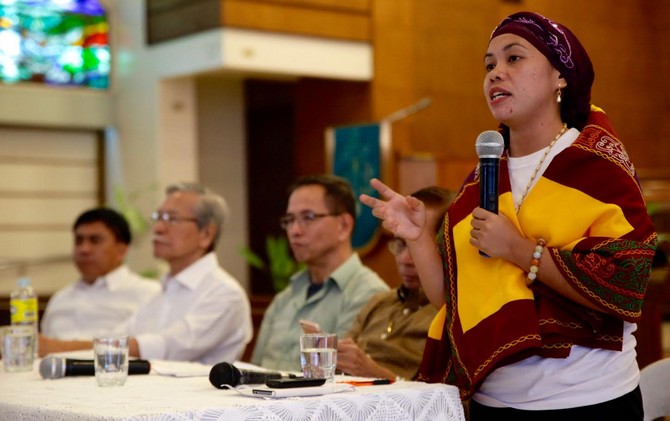Presidential peace adviser Jesus Dureza at the consultation forum for indigenous peoples' participation in the peace process with the communist rebels and the Bangsamoro. Photographed by Bernard Testa, InterAksyon
Presidential Peace Adviser Jesus Jess Dureza said on Wednesday that he will organize an Indigenous Peoples Advisory Council to give ethnic groups and cultural minorities a voice in the ongoing peace negotiations with the National Democratic Front of the Philippines (NDFP) as well as in the Bangsamoro Transition Council (BTC) that would work toward creating a new law for the Bangsamoro.
"I have already taken this up with the President, and he approved," Dureza said during a forum on "The Peace Process of GPH & the NDFP and its Impact on Indigenous Peoples" at the United Church of Christ in the Philippines (UCCP) in Manila.
Speaking before a crowd of indigenous peoples (IPs) from various parts of the country, Secretary Dureza gave cognizance to the importance of the sector in the peace process.
The creation of an advisory council, he said, would enable cultural minorities to participate in and provide inputs on issues that impact their sector in the peace talks with both the communist and the MILF rebels.
"We cannot promise na lahat ng sasabihin nila ay mangyayari, but at least they know na narininig sila at may mga aksyon na gagawin din (We cannot promise that all their demands will be addressed, but at least they know they are being heard and actions are being taken)," he added.
Peace talks with the NDFP, the political arm of the Communist Party of the Philippines (CPP), resumed in Oslo, Norway this August after President Rodrigo Duterte, who is known to have friendly ties with the left, expressed his intention to achieve a just and lasting peace in the country during his term.
On its second round of peace talks that took place earlier this month, both the government and the NDFP agreed on a framework and an outline for the Comprehensive Agreement on Socio-Economic Reforms (CASER) aimed at improving the lives of Filipinos.
Meanwhile, the government panel and the MILF are waiting the executive order on the creation of a 21-member Bangsamoro Transition Commission that would draft a law for the Bangsamoro replacing the junked Bangsamoro Basic Law (BBL).
"We hope we will have a very inclusive new law that Congress, I hope, will approve," Dureza said.
IPs' support and concerns
During the forum, IP leaders supported the ongoing peace negotiations, saying they finally have a voice in the Duterte administration.
However, Kernan Fanagel, a B'laan who is also the chairperson of the IP group PASAKA, expressed concern about the possibility that the advisory council could turn out to be a repeat of the Indigenous Peoples' Right Act, or the IPRA law, which, he claimed, did not turn out to be effective in advancing the interests of IPs.
"We saw that, ironically, the IPRA became, instead, the venue for advancing the interest of large industrial-scale plantations and mineral extraction activity that effectively thwarted the noble purpose of the law, driving many indigenous communities from their lands and ancestral domains," he lamented, in Filipino.
Fanagel urged the newly formed IP and Moro alliance, Sandugo to push for a separate section pertaining to national minorities in CASER.
Other IP leaders in the forum discussed, in the presence of Dureza, as well as Makabayan Coalition president Satur Ocampo, and NDFP consultant Benito Tiamzon certain residual issues of concern with the government, especially in the community level.
Among the problems were the militarization of many communities in the remote areas, as well as breaches of human rights and killings of their members.
They also mentioned the recurrent attacks on Lumad schools in Mindanao, resulting in Lumad families becoming displaced from their villages, and the red-tagging of its teachers and students by the military.
Issues on ancestral domain, environmental access, and conflicts with big businesses also came up.

Bai Ali Indayla, secretary general of the group Kawangib Moro Human Rights Group, observes that the Philippine National Police (PNP) and the Armed Forces of the Philippines (AFP) had not yet significantly aligned themselves with President Duterte's peace pronouncements. Photographed by Bernard Testa, InterAksyon.
Bai Ali Indaylah, a former government employee, now heads a volunteer organization that promotes peace and justice advocacy for the Moro people during peace forum at the Cosmopolitan church in Manila.
She cited the clash between operatives of the PNP and activists during the anti-United States rally in front of the US Embassy just this Oct. 19. While the president spoke of putting an end to US involvement in local matters, Indayla said, the police seemed taking the side of the Americans during the Oct. 19 rally.
"One of the important actions of the government of the Philippines today, particularly by our president, would be to let the AFP and the PNP understand the direction in which he is steering the country."
She also said the indigenous communities would continue driving the agenda of the Moro and IP's right to self-determination to both the government panel and the NDFP on the peace negotiations.
http://www.interaksyon.com/article/133732/dureza-to-create-ethnic-groups-advisory-council-in-peace-talks

The Philippine government is being outmaneuvered by the commies. It appears that the proposed Indigenous Peoples Advisory Council will likely be dominated by CPP activists like Kernan Fanagel (PASAKA) and Bai Ali Indayla (KAWAGIB) mentioned in the article above, both of whom head up known Communist Party of the Philippine front organizations.
ReplyDeleteAnd for good measure, there are several leftists/former CPP activists on the government negotiating team engaged in peace talks with Sison and his NDF sycophants.
Best guess is that sooner or later the commies will issue a pre-condition or demand for the continuation of the ceasefire that will include the withdrawal of military units from lumad/indigenous people's areas and a halt to OPLAN Bayanihan activities by the Armed Forces of the Philippines.